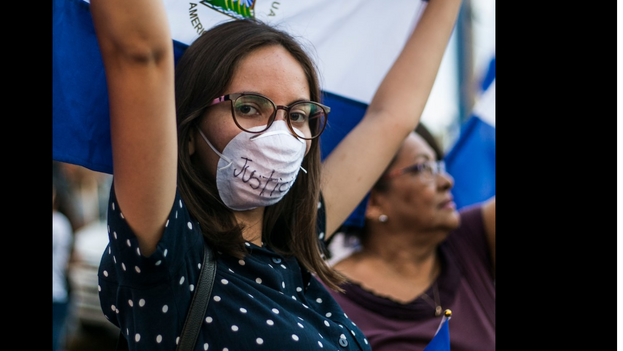
![]() 14ymedio, Yunior García Aguilera, Madrid, 2 February 2023 — I have seen the documentary Nicaragua, patria libre para vivir [Nicaragua, a Free Homeland to Live In], three times, and all three times it has shaken me to the core. Its director, the Andalusian poet and philologist, Daniel Rodríguez Moya, says that you can be born anywhere in the world and love it, but you can also choose a land to love, without necessarily having been born there. And he decided, 20 years ago, to fall in love with Nicaragua.
14ymedio, Yunior García Aguilera, Madrid, 2 February 2023 — I have seen the documentary Nicaragua, patria libre para vivir [Nicaragua, a Free Homeland to Live In], three times, and all three times it has shaken me to the core. Its director, the Andalusian poet and philologist, Daniel Rodríguez Moya, says that you can be born anywhere in the world and love it, but you can also choose a land to love, without necessarily having been born there. And he decided, 20 years ago, to fall in love with Nicaragua.
Daniel sold his poetry publishing company in Granada to finance his film. He went with his camera to the land of volcanoes and faced a thousand dangers to leave a memory of the popular rebellion that shook that country in 2018. Beyond the award at the Invisible Film Festival in Bilbao, what excites the poet is that Nicaraguans have found in his images a bastion against forgetting.
Because they show convulsive times. Sometimes the world prefers to look away and ignore that there are dictatorships in our America, the same or worse than those that stained the Twentieth Century with blood. Sometimes sanctions are not enough to stop those who violate human rights with impunity, trampling on democracy. Sometimes there is an “idiotic left,” as sociologist Sofía Montenegro calls it in the documentary, that continues to support these tyrants in the name of a sick romanticism.
The testimony of someone like Sergio Ramírez, a Cervantes award winner and former vice president of Nicaragua, is overwhelming. Sergio had the moral stature to move away from a revolution that had already lost its course. And after the 2018 protests, Ortega ordered his capture. The novelist had already suffered persecution under Somoza. Now he would be persecuted by his own comrades in the struggle. The founder of the literary festival Centroamérica cuenta, the most important literary festival in the region, recounts how he preferred to be considered a traitor by the beasts, rather than become one of them.
One shudders to hear the verses of Gioconda Belli, a multi-award-winning writer who has also had to go into exile. The author of La mujer habitada [The Inhabited Woman] would never accept being an accomplice of someone who overthrew Anastasio Somoza to end up becoming another dictator. Nicaragua’s best children have had to leave or are trapped in its dungeons.
I have told Moya that I would love for Cubans to be able to see his movie. It is obvious that the Island’s regime would never allow such a film at its festivals, much less dare to put it on television. But it would be fabulous if it could sneak into the paquete* [“Weekly Packet”] so Cubans could look at themselves in the mirror. There are too many similarities to our own history.
Every time Rosario Murillo, current vice president and wife of Daniel Ortega, mentions the word “love,” one feels nauseated. But in Cuba they also hide behind words such as “solidarity” or “humanism,” while the minions beat our young people in the streets, surveille our poets and condemn an entire country to the most abject poverty.
I have rarely seen an entire audience cry in front of a documentary. And with this one it has happened to me three times. When the father of one of the murdered boys talks about his last meeting with his son, you can’t help but break down. There is too much truth in his words and too much helplessness in his eyes, but not a single trace of hatred. And I think of all the mothers of our boys in Cuba. I think about everything that went through their heads when they saw the Mothers of Plaza de Mayo meet in Argentina with the Cuban dictator who gave the order to fight against our children.
How could those illustrious ladies forget the origin of their causes? How can they put ideological interests before the most elementary sense of justice? I prefer to believe that they are very stunned by the “lobby” and the propaganda displayed by a regime addicted to lies. I prefer to tell our mothers: forgive them, because they know not what they do.
Even the title of this documentary has a close relationship with our reality. The Sandinista revolution has used as its motto a phrase that Augusto César Sandino used as a battle cry in 1927: “A free homeland or death.” And in Cuba, since 1960, Fidel Castro would culminate all his endless speeches with the slogan: “Homeland or Death.” It is no coincidence that both Cubans and Nicaraguans have developed that rejection of the word “death.”
It is time for us, in Nicaragua, Venezuela, Cuba, and in every corner where there is a stupid and hypocritical dictatorship, to close ranks. It’s time to replace death with life, and not just in songs.
*Translator’s note: El Paquete Semanal, the weekly package, is a collection of digital material distributed underground.
Translated by Regina Anavy
____________
COLLABORATE WITH OUR WORK: The 14ymedio team is committed to practicing serious journalism that reflects Cuba’s reality in all its depth. Thank you for joining us on this long journey. We invite you to continue supporting us by becoming a member of 14ymedio now. Together we can continue transforming journalism in Cuba.
